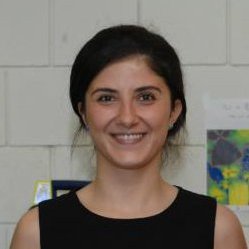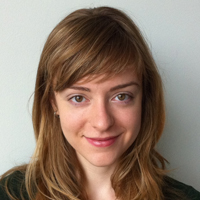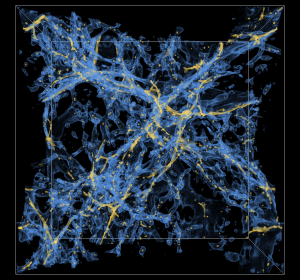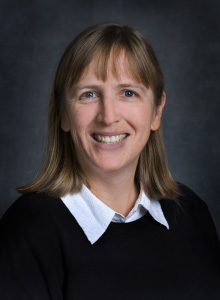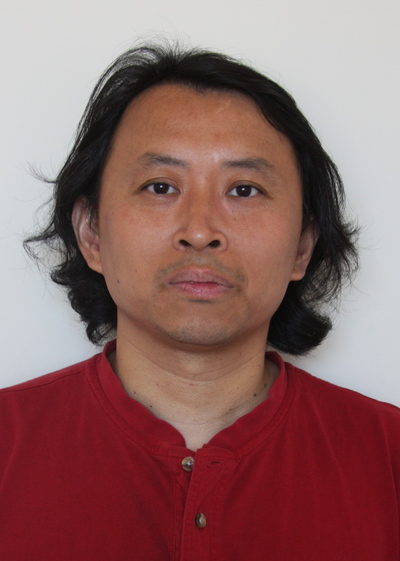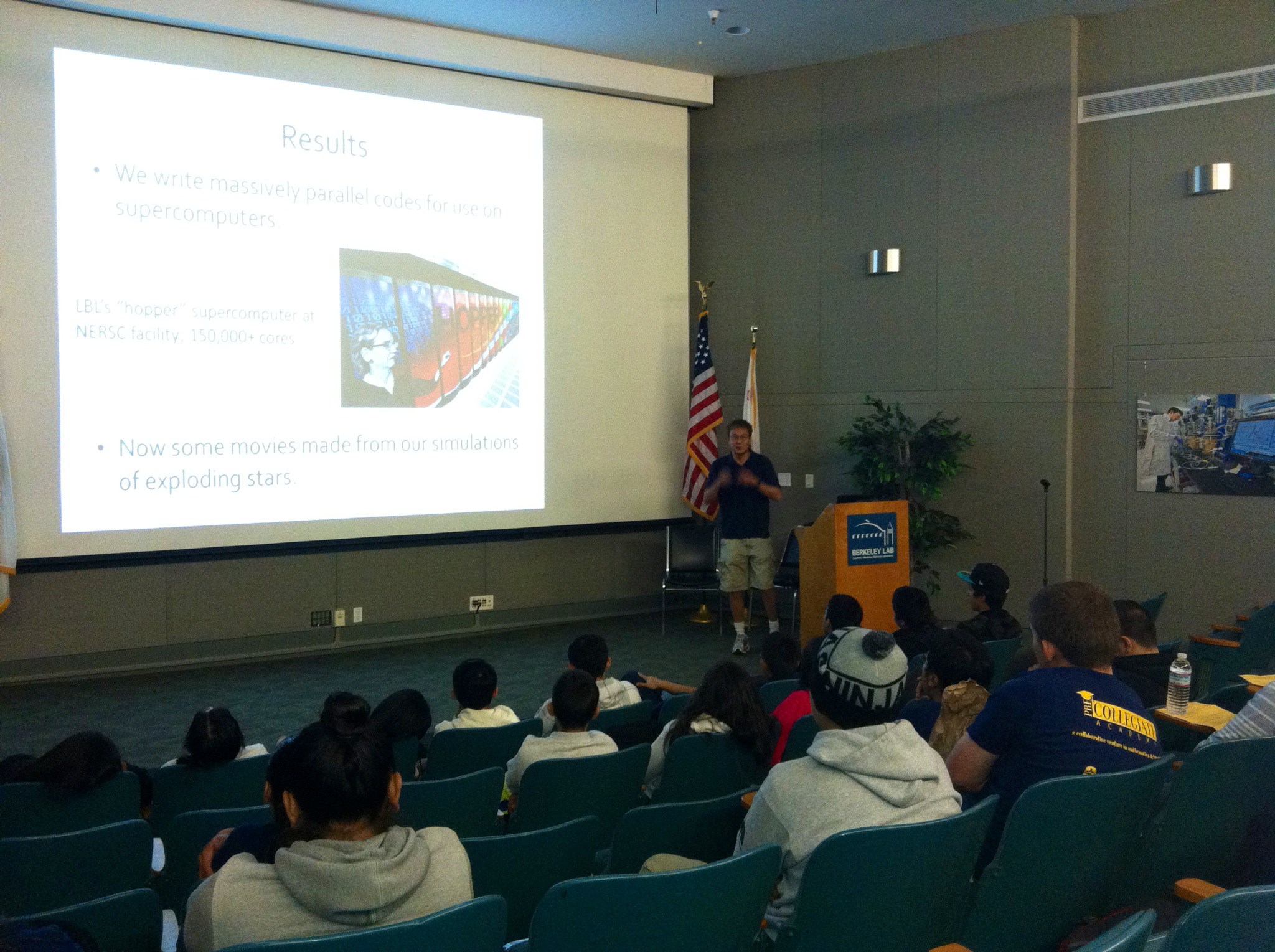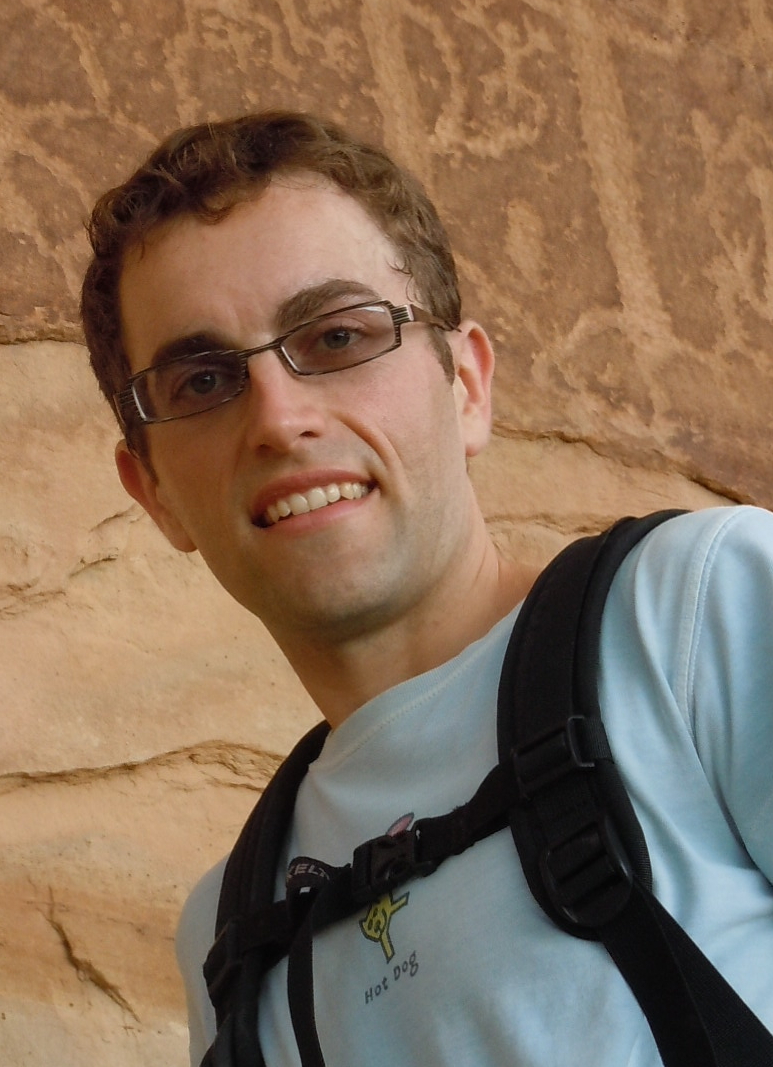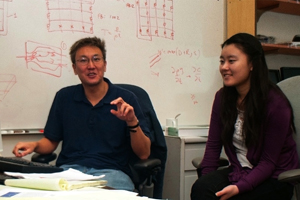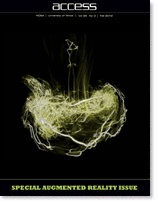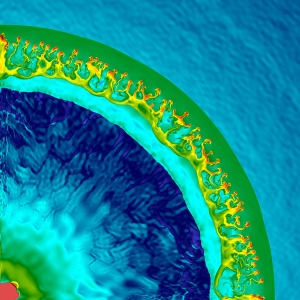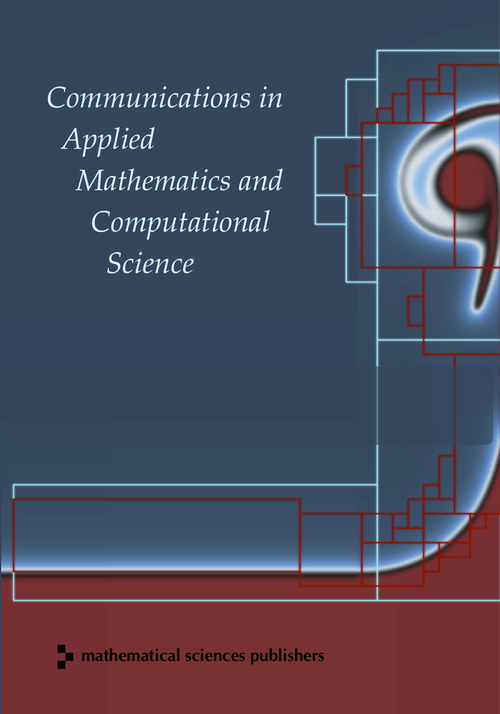
December 2013 News
Dr. Tulin Kaman Visits CCSE
Dr Tulin Kaman,
who received her Ph.D. with Dr James Glimm at Stony Brook University,
and is currently a postdoctoral fellow at the Paul Scherrer Institut and ETH-Zurich,
recently visited CCSE for three weeks to continue her work on adding the BoxLib AMR capability
to the OPAL code for particle accelerator simulations.
OPAL
is a tool for charged-particle optics calculations in large accelerator structures
and beam lines. By adding BoxLib's AMR capability to OPAL, Dr. Kaman will be able
to solve for the internal electric and magnetic field on an adaptive hierarchy of successively
finer meshes embedded in the irregular particle accelerator geometry, and subcycle in time
to further optimize the computation.
|
|
|
|
Former DOE CSGF Fellow Leslie Dewan Is Named In "30 People Under 30 Changing the World"
Leslie Dewan, a former DOE Computational Science Graduate Fellowship
(CSGF) Fellow who spent the summer of 2011 working
in CCSE, has just been named to Time Magazine's list of
"30 People Under 30 Changing the World". According to the website,
"Leslie Dewan's planned Waste-Annihilating Molten-Salt Reactor ... could have
a major impacton the energy sector."
See the Time profile
here.
|
Nyx Simulation Featured in Deixis Magazine
The lead article in this week's online Diexis Magazine,
which describes Computational Science at the National Laboratories,
is titled "Rewinding the Universe," and features a cosmological simulation performed
using the BoxLib-based Nyx code. The simulation was perfored by Zarija Lukic of
CRD and graduate student Casey Stark of UC Berkeley.
See the full article
here
|
|
August 2013 News
|
|
Almgren Gives Invited Presentation at 42nd SPEEDUP Workshop on High-Performance Computing
Ann Almgren gave an invited presentation entitled BoxLib: A Software Framework for
Block-Structured AMR Applications at the
42nd SPEEDUP Workshop on High-Performance Computing
Workshop held at the
Paul Scherrer Institut (PSI)
in Villagen, Switzerland, on August 29-30, 2013.
The focus of the workshop this year was Adaptive Mesh Refinement, and featured talks
about AMR software and applications.
|
CASTRO Radiation Paper by Zhang et al. the Top Downloaded Publication in CRD This Week
According to
ResearchGate,
the top downloaded publication in CRD this week was
CASTRO: A New Compressible Astrophysical Solver. II. Gray Radiation Hydrodynamics,
by Weiqun Zhang,
Louis Howell of LLNL,
Ann Almgren,
Adam Burrows of Princeton University, and
John Bell.
Second on the list was another CCSE paper titled
An Adaptive Level Set Approach for Incompressible Two-Phase Flows.
And, according to ResearchGate, during the same week,
Ann Almgren
was CRD's "Top Member by Publication Downloads."
|
|
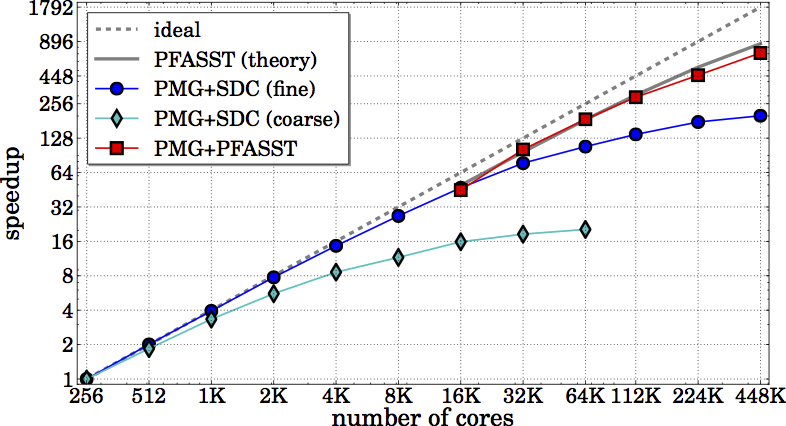
|
Emmett and collaborators awarded membership in the Julich Supercomputing Centers High-Q Club
The JSC
High-Q Club is a showcase for codes that can utilise the entire
JUQUEEN supercomputer at JSC (458,752 cores).
Matt Emmett, along with collaborators Robert Speck, Daniel
Ruprecht, and Mathias Bolten developed a parallel solver for
time-dependent PDEs with stiff linear stiff terms. The code uses a
parallel multigrid solver (PMG) for spatial solves of the
implicit/stiff term, and the parallel full approximation scheme in
space and time (PFASST) integration scheme to evolve the system
through time. This combination of PMG+PFASST parallelizes the system
in both the spatial and temporal directions. For a fixed size
problem, the parallel speedup using only PMG saturates before the full
core count is reached. Using PFASST in conjunction with PMG allows
the same fixed size problem to scale to all cores on JUQUEEN.
|
CCSE Summer Student Jonathan Wang Wins "Most Original Poster" Award at Computing Sciences Summer Student
Poster Session
Congratulations to CCSE summer student Jonathan Wang, whose poster on "A Comparison of the V-cycle and FMG-Cycle"
won the "Most Original Poster" award at the Computing Sciences Summer Student (CSSS) poster session on
Thursday, August 1. Working with Ann Almgren, as well as Mike Lijewski and Sam Williams,
Jonathan has spent the summer investigating the computational efficiency of the multigrid
V-cycle and FMG-cycle for a variety of coefficients, boundary conditions, resolutions, and problem types.
Jonathan will be a senior at UC Berkeley this fall with a major in mechanical engineering.
|
|
July 2013 News
|
|
Nonaka Speaks to East Bay Consortium of Educational Institutions
About 50 students from the
East Bay Consortium of Educational Institutions
visited Berkeley Lab on July 26, 2013 to learn about careers in science,
technology, engineering and mathematics. Deb Agarwal, who heads CRD's
Advanced Computing for Sciences Department, welcomed the group and gave a
brief overview of Berkeley Lab.
Andy Nonaka
(CRD) talked about his research in computational astrophysics;
Ben Bowen (Life Sciences Division) talked about
mass spectrometry and Susan Amrose(Environmental Energy Technology Division)
talked about engineering for economic and social development. The visit
culminated with a tour of the Advanced Light Source led by Christine Beavers,
Bruce Rude, Thomas Scarvie and Doug Taube. CRD's Sarah Poon organized the visit.
See the photos.
|
May 2013 News
George Pau Wins DOE Early Career Award
George Pau, a former Alvarez Postdoctoral Fellow who worked in CCSE for three years
and is now a research scientist in LBNL's Earth Sciences Division, has been honored with a
2013 Department of Energy Early Career award. His abstract, titled "A Multiscale Reduced-Order
Method for Integrated Earth System Modeling," describes his proposed work to build a new
kind of "reduced-order" climate model, made up of statistical approximations or "surrogates"
for multi-scale processes that can be solved much more quickly than a full climate model.
Congratulations, George!
|
|
April 2013 News
|
|
Former CCSE Postdoc Featured in DOE "New Faces" Profile
Aleks Donev, former CCSE postdoctoral researcher, now assistant
professor of mathematics at Courant Institute of Mathematical Scientists,
recipient of a five-year DOE Early Career
Research Award and CCSE collaborator,
has recently been profiled in the DOE ASCR "new faces" series.
The profile is titled "Of colorful candies and fluid dynamics," and
describes Donev's career path and research interests.
See the full article
here.
|
Zhang and Almgren Co-Authors on APS Paper about CASTRO Simulations
Ann Almgren
and
Weiqun Zhang
are co-authors of a paper to be presented at the
American Physical Society April Meeting,
April 13--16, in Denver, Colorado. The April Meeting gathers particle physicists,
nuclear physicists, and astrophysicists to share new results and insights.
The paper, titled
"The Most Powerful Stellar Explosions," presents the results of 3D simulations
of thermonuclear supernovae using CCSE's CASTRO code. Ke-Jung Chen of the University of Minnesota is
the principal author, with contributions from Alexander Heger of Monash University
and Stan Woosley of UC Santa Cruz.
|
|
March 2013 News
|
|
Nonaka Speaks to Kennedy High School Students
As part of Berkeley Lab Computing Sciences' ongoing outreach efforts with the Kennedy High School
IT Academy in Richmond, 11 students and two teachers spent half the day March 20 learning about
different career opportunities in computing and networking. The event was organized to give the
students ideas about career paths beyond the basics of computer science and web design taught in
the classroom.
Andy Nonaka
of the Center for Computational Sciences and Engineering talked about "Using Math to
Blow Up Stars" in which he described how he uses his applied math skills to create detailed
simulations of supernovae, as well as other complex phenomena
See the article
here.
|
Nonaka Hosts Albany High Student on Annual Job Shadow Day
As they have for the past five years, Berkeley Lab staff members hosted Albany High School
juniors as part of the school's annual Job Shadow Day. In all, six scientists
played host/mentor this year.
Andy Nonaka
of the Center for Computational Sciences and Engineering volunteered as a host in CRD.
See the article
here.
|
|
February 2013 News
|
|
CASTRO Simulation Appears on Back-to-Back Access Magazine Covers
A new image from a recent Type Ia supernova post-ignition simulation using CCSE's CASTRO code is
featured on the cover of NCSA's Access Magazine, available
here.
This particular simulation has been featured on
back-to-back covers.
The CASTRO simulation was performed by
Chris Malone and
Stan Woosley
of UC Santa Cruz, and
Andy Nonaka of CCSE,
and used 24 Million CPU-hours from a Blue Waters Early Science System Award. This simulation ran on
64,000 cores and used 5 levels of AMR in order to realize an uprecedented ~100m resolution.
Visualization courtesy of Robert Sisneros and Dave Semeraro of NCSA.
|
|
|
Former DOE CSGF Fellow Leslie Dewan Makes Top 30 List in Forbes
Leslie Dewan, a former DOE Computational Science Graduate Fellowship
(CSGF) Fellow who spent the summer of 2011 working
in CCSE, has just been named to Forbes "30 Under 30: Energy" list. This list
seeks to identify "the field's brightest stars under the age of 30."
Dewan, currently a PhD student at MIT, is also the co-founder and CEO of
Transatomic Power, a new company that seeks "turn nuclear waste into a
safe, clean and scalable source of electricity."
See the Forbes profile
here.
|
January 2013 News
Five Reasons to Publish in CAMCoS
David Ketcheson, an assistant professor and leader of the
Numerical Mathematics Group at the King Abdullah University
of Science and Technology (KAUST), recently posted a blog entitled
"Five reasons why you should submit your next paper to CAMCoS." In this blog,
which starts, "I have a new favorite journal... " and goes on to say,
"CAMCoS is a hidden gem ...", Ketcheson gives his top five reasons to publish in
Communications in Applied Mathematics and Computational Science,
an online journal of which
John Bell
is a co-founder and managing editor. See the blog post
here.
|
|
|
|
Bell Co-PI on 2013 INCITE Award to use CASTRO to study Type Ia Supernovae
John Bell
is a co-PI on a recently announced 2013 INCITE award for a project called
"Petascale Simulations of Type Ia Supernovae". Prof. Stan Woosley of UC Santa Cruz is
the PI on this award that received 55M hours on Titan. The simulations of Type Ia
supernovae will be performed using
CASTRO,
a compressible radiation-hydrodynamics code developed by CCSE.
|
Archive
|




